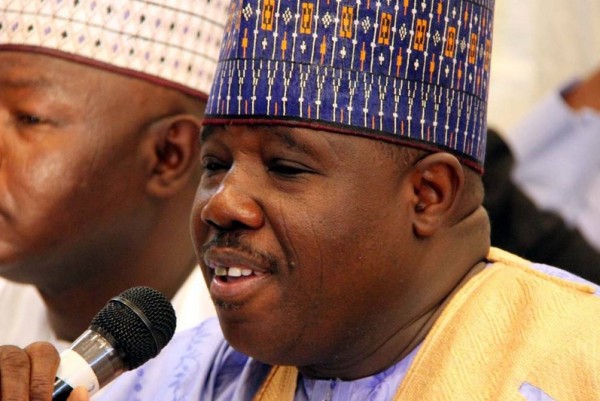BY ABDULLAHI SULE
For more than a decade, a deliberate and malicious narrative has been sustained by political detractors to tarnish the towering reputation of Senator Ali Modu Sheriff, the former governor of Borno State and one of Nigeria’s most strategic political minds. These traducers, threatened by his rising influence and political dexterity, have labored endlessly to associate him with the creation or sponsorship of Boko Haram — a terrorist group that has devastated the North-East and stained Nigeria’s security landscape.
But history, timelines, and verifiable facts speak loudly against this orchestrated falsehood. Ali Modu Sheriff neither founded, funded, nor fraternized with Boko Haram — directly or indirectly. He is, in fact, one of the earliest political victims of the insurgency.
To expose the lies and reveal the truth, one must revisit the historical timeline of events — because truth is constant even when falsehood is loud. In the year 2000, when Governor Mala Kachallah presided over Borno State, the administration introduced the Borno State Administration of Justice Law 2000, effectively ushering in the implementation of Sharia law within the state’s justice system. To oversee and guide this reform, the government established a Sharia Implementation Committee, chaired by the respected academic Professor Abubakar Mustapha. Among the members of that committee was a young cleric named Mohammed Yusuf — the same man who would later evolve into the ideological father of Boko Haram.
Advertisement
That singular fact is critical: Boko Haram’s ideological root was already planted and nurtured three years before Ali Modu Sheriff became governor in 2003. The movement’s origin was not political; it was an offshoot of the wider religious fervor that swept across Northern Nigeria at the turn of the millennium. The records are clear — Ali Modu Sheriff did not introduce Sharia law in Borno State, nor did he constitute the committee that birthed the ideological base from which Boko Haram would later emerge. He inherited that reality as part of the complex socio-religious terrain of the state.
When Senator Ali Modu Sheriff assumed office in 2003, his immediate challenge was to stabilize a state already contending with rising religious radicalism and youth restiveness. Boko Haram, at that time known locally as the “Yusufiyya Movement,” operated as a fringe sect of disenchanted youths captivated by Mohammed Yusuf’s anti-Western rhetoric. As a pragmatic leader, Sheriff sought to manage the growing extremism through inclusion and rehabilitation rather than outright confrontation — an approach that mirrored the policy direction of many northern leaders at the time who were attempting to calm rather than inflame the volatile social atmosphere.
Ali Modu Sheriff’s administration focused on expanding opportunities for education, entrepreneurship, and social development. He built schools, created job opportunities, expanded rural infrastructure, and introduced economic empowerment programs — all aimed at addressing the same poverty and hopelessness that extremist preachers exploited to lure followers. His leadership style was bold, inclusive, and development-driven, not ideological or sectarian.
Advertisement
However, the extremist movement that began under the watch of the preceding administration took a darker turn years later. Following Mohammed Yusuf’s arrest and extra-judicial killing in 2009, the sect’s remnants transformed into the violent insurgent organization now known as Boko Haram.
The government of Senator Sherif having realized the enormity of the existential threat that the Boko Haram sect constituted quickly set up Operation Flush which was a combined operation team of Army,police and other military agencies for the containment of the insurrection against the government and the people of Borno state .
The government of Ali Modu Sherif never established a Civilian JTF or any similar group to fight against insurgency..What they did was setting up a group that was strictly operated and recognised by constituted authority and backed by the laws and the constitution of Federal Republic Of Nigeria.
This singular action of setting up a group led by the military infuriated Boko haram to target him as their number one enemy and he became the most wanted man for elimination on their list.This led to the killing of his immediate younger brother Alhaji Goni Mustapha Sheriff,his first cousin who happens to be the state chairman of ANPP at that time Alhaji Awana Ngala was equally mauled down by the bullets of the sect .Equally eliminated was Senator Sheriff’s bosom friend Alhaji Mustapha Fulawama .Alhaji Bukar goni kolo was equally a victim of the anger against sheriff and a host of others that were destroyed,maimed or killed because of their angst against Senator Ali Modu Sheriff.
Advertisement
It is right to say that Senator Ali modu Sheriff is one of the biggest victim of the Boko haram insurgency in Borno as he has lost very close family friends and blood relatives because of his efforts to secure Borno State and stem the tide of the early rising violence Boko Haram represented.
It was after Ali Modu Sheriff’s tenure had already matured that the group fully embraced terrorism, bombings, and assassinations. The real descent into chaos began under a different administration — but the desperate enemies of Sheriff saw in this tragedy an opportunity to smear him.
Unable to match his political sagacity, grassroots appeal, and boldness, they began a coordinated effort to rewrite history and weaponize misinformation. They pushed the narrative that he sponsored Boko Haram — a claim utterly unsupported by any evidence. Yet, repetition gave the falsehood life. The smear campaign was not born of truth but of envy and fear — fear of his influence, fear of his unbending will, and fear of his relevance both within Borno and the larger Nigerian political arena.
But facts remain sacred. Every credible security investigation and intelligence assessment, from the Department of State Services (DSS) to the National Intelligence Agency (NIA) and even foreign intelligence partners, found no link between Ali Modu Sheriff and Boko Haram’s creation, funding, or operations. Not one document, not one statement, not one financial trail has ever tied him to the sect. If anything, Boko Haram targeted him and his associates repeatedly. His properties were attacked, his close aides were killed, and his name was explicitly blacklisted by the insurgents as a symbol of the establishment they sought to destroy.
Advertisement
How then could anyone logically accuse a man of sponsoring a group that declared him an enemy of its cause? The very idea collapses under the weight of evidence and reason. Ali Modu Sheriff did not benefit from the crisis; he bled from it.
What truly motivates this persistent campaign of calumny is political fear. Sheriff’s unmatched record as the first governor in Borno’s history to complete two consecutive terms established him as a political force of nature. His capacity to mobilize, strategize, and build alliances across ethnic, regional, and party lines unsettles even the most entrenched political dynasties in the North. For years, he has proven that his influence is not limited to Borno — it radiates across Nigeria’s political landscape. And this, more than anything else, terrifies his detractors.
Advertisement
It is therefore not surprising that those who lack his depth and courage have resorted to character assassination — inventing tales of terrorism sponsorship to discredit him. But the Nigerian public is wiser now. The facts are out, and the timeline is indisputable. Boko Haram existed before Sheriff’s administration, escalated after his exit, and targeted him personally during its peak. The truth is no longer hidden.
Beyond defending himself, Ali Modu Sheriff’s record speaks volumes. Under his stewardship, Borno witnessed infrastructural modernization, expanded trade, improved healthcare delivery, and educational reform. His government empowered women and youth, built rural roads, and opened up new economic corridors that changed the face of Borno.
Advertisement
At the expiration of his tenure in 2011 he handed over not debts but a staggering sum of #67B (Sixty seven billion naira) to his predecessor the only Governor that left such a humongous amount of money among his contemporaries.
These are not the actions of a man promoting chaos; they are the legacy of a visionary leader dedicated to growth, peace, and progress.
Advertisement
Even after leaving office, Sheriff has remained a voice for stability and reconciliation. He has worked quietly with various stakeholders in the North-East to support counterterrorism efforts, rebuild communities, and foster political understanding. He continues to stand firm in the face of lies, because he knows that truth does not require shouting — it only requires time.
In the final analysis, Nigerians must see through the smoke of propaganda. The campaign to link Ali Modu Sheriff with Boko Haram is not about national security; it is about political survival for those who fear his return to prominence. It is about envy masquerading as concern, and insecurity disguised as righteousness. The detractors know that a man like Sheriff — with his experience, intellect, and nationwide connections — remains a formidable force in any political equation.
But time is the ultimate judge. And as time has begun to reveal, Ali Modu Sheriff was never the father of Boko Haram, but one of its earliest political casualties. The attempt to criminalize his name will fail because truth has a longer life than propaganda. The facts are unshakable, and history will vindicate him.
Ali Modu Sheriff stands today not as a conspirator in Nigeria’s dark security history, but as a leader unjustly maligned by those who tremble at his influence. His story is one of resilience, persecution, and ultimate vindication. Those who built their politics on slander will fade with time, but truth — as always — will stand unbent.
Ali Modu Sheriff did not create Boko Haram. He inherited it, fought it, suffered from it, and has lived to be vindicated by truth.
Abdullahi Sule
Public Affairs Analyst
Abuja
Views expressed by contributors are strictly personal and not of TheCable.



